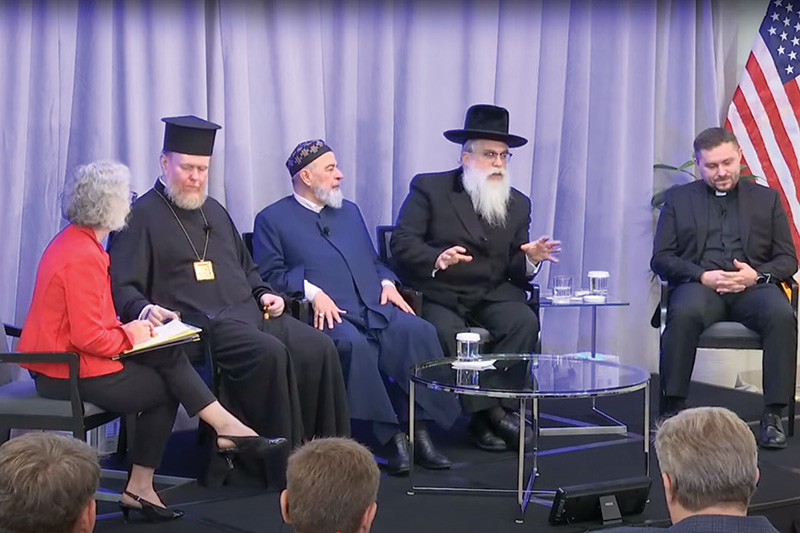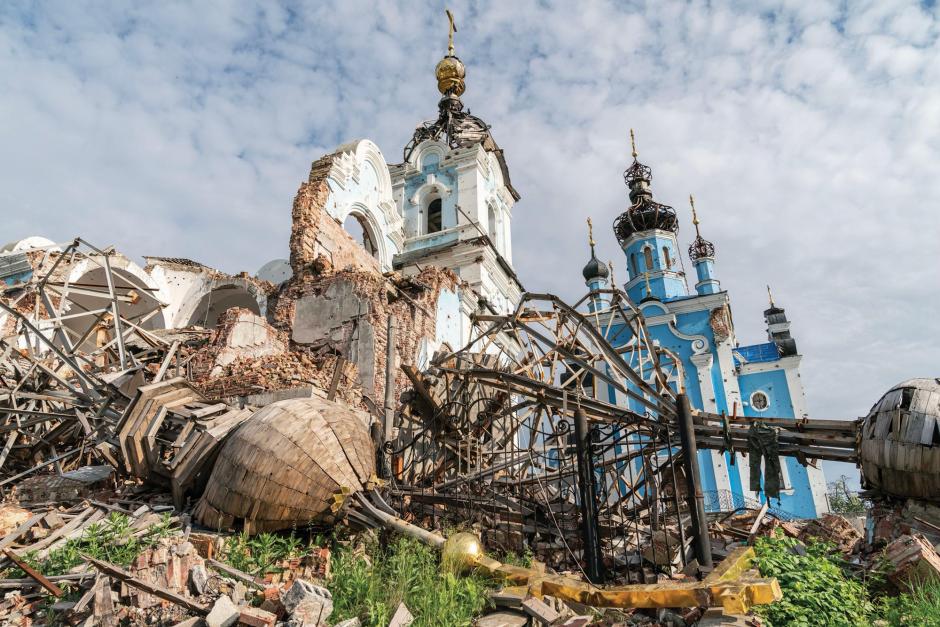Challenges Mount for Faith Groups in Ukraine
Ed Cook March/April 2024The pressures of war strain religious freedom norms.
As the conflict in Ukraine enters its third year, faith communities are enduring harsh conditions, with more than 500 churches, mosques, synagogues, and other religious buildings destroyed or damaged by the Russian military. A recently proposed national law, however, raises a new challenge and highlights Ukraine’s complicated religious landscape. The Ukrainian Rada (national general assembly) has proposed legislation—Draft Law 8371—that would require all Russian Orthodox churches to register with the government and to submit a signed pledge of loyalty. It would also require these churches to submit lists of their members and spiritual leaders.

A Complicated Past
A delegation of Ukrainian religious leaders, representing most major faith groups in Ukraine, provided historical and political context for the proposed religion law at an event in Washington, D.C. organized by the United States Institute of Peace (USIP). The group traveled to the United States last year to call attention to the suffering of religious organizations and their members under the current conditions of war. At the October 30 event they spoke about the “Maidan Movement” of almost a decade ago—a popular uprising that orientated Ukraine away from Russia’s cultural and political dominance, and toward the West. It also led Russia, just weeks later, to annex Ukraine’s Crimean Peninsula.
Today divided national allegiances are reflected within Ukraine’s religious community. Some 40 percent of Ukrainians belong to the Ukrainian Orthodox Church of the Kyivan Patriarchate (which is independent from Russia), while some 19 percent are members of the Ukrainian Orthodox Church of the Moscovian Patriarchate (which remains loyal to Russia).
Delegation members spoke of recent Russian atrocities against faith groups in Ukraine, including six missile strikes against an evangelical seminary, the murder of pastors, and—in the Russian-controlled contested regions of Luhansk and Donetsk—the killing of citizens for merely belonging to a faith other than Russian Orthodox. These actions have been labeled as war crimes by many within the international community. Delegate members stressed, however, the distinction between the actions of the Russian government and members of the Russian Orthodox Church. The latter, they said, have not participated in alleged war crimes.
Religious Freedom—Another Casualty?
Delegation members agreed that a fine line exists between religious freedom and national security. Under normal conditions, the Ukrainian constitution guarantees religious freedom for all religious organizations. But in light of the current war, the Russian Orthodox Church is considered by many to be a proxy power. According to the Ukrainian delegation, Russian Orthodox priests have worked with Russia to undermine the Ukrainian government. Their actions include blessing Russian soldiers and raising money to hire mercenaries to fight against Ukraine.
Delegation members also pointed to evidence of the Russian Orthodox Church’s complicity with Soviet authorities in Russia, dating back to the 1940s. According to one speaker, Stalin’s government was instrumental in creating the Moscow Patriarchate, which became the recognized head of the Russian Orthodox Church. During the Soviet era, Russian Orthodox priests did not just preach but also disseminated Kremlin propaganda. Russia also attempted to co-opt other non-Orthodox religious groups. All faiths had to decide whether to submit or face scrutiny, harassment, and discrimination. For those religious entities that opted to support the Soviets, their leaders were at times required to meet with Soviet officials and to offer them a priestly blessing.
In contrast, religious groups that refused to cooperate with the Kremlin were denied religious freedom. In the case of the Roman Catholic Church in Russia, for instance, there was not a single registered parish during the Soviet era. Similarly, in the modern context, the Ukrainian Catholic Church has been declared unregistered, or illegal, in the Russian-controlled contested regions of Luhansk and Donetsk.
One of the delegation members revealed that in 2005 he had been approached by the Russian Federal Security Service (FSB), which is responsible for internal security and counterintelligence services. The FSB attempted to recruit the faith leader; his assigned task would have included disseminating disinformation and creating an organization of networks to undermine the Ukrainian government.
Unintended Consequences
According to delegation members, the new religion law proposed by Ukraine’s Rada is designed to restrict the ability of Russia to co-opt religious entities in Ukraine for political and malicious purposes.
However, a significant area of concern with the religion law is its potential enforcement mechanisms. Given that the law would require Russian Orthodox churches and their members to sign an oath of loyalty to the Ukrainian government, how would compliance be ensured? Would it entail Ukrainian intelligence services infiltrating those churches periodically to interact with members unbeknown to them? Would national security agencies monitor phone and email conversations of church members suspected of collaborating with Ukraine’s enemies? Would Ukrainian intelligence services conduct surveillance of church members and their associates?
Another concern is the long-term impact such concessions to religious autonomy could have on the principle of religious freedom in Ukraine. After the war ends, what guarantees do religious organizations have that freedom from government oversight would be restored?
These concerns were raised during the question-and-answer period at the October 30 event. In response, Dr. Peter Mandaville, senior advisor for Religion and Inclusive Societies at USIP, said there was an ongoing dialogue between religious freedom advocates and the Ukrainian delegation about the larger, long-term repercussions to religious freedom at stake. He also noted that there were continuing discussions between the Ukrainian Council of Churches and the Ukrainian government about drafting legislation with a delimiting clause that would require the Ukrainian government to cease surveillance activities when the war ended.
At the time of writing, Draft Law 8371 was still awaiting final passage by the Rada.
Article Author: Ed Cook
Ed Cook has a doctorate in church-state studies from Baylor University, Waco, Texas, where he currently leads in church religious liberty activities.
